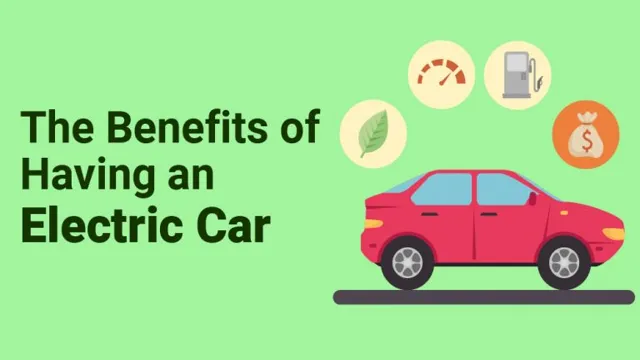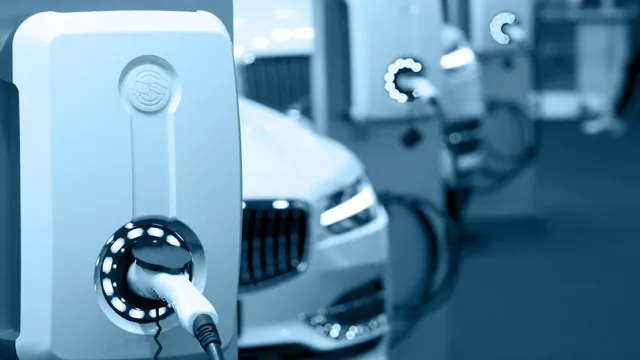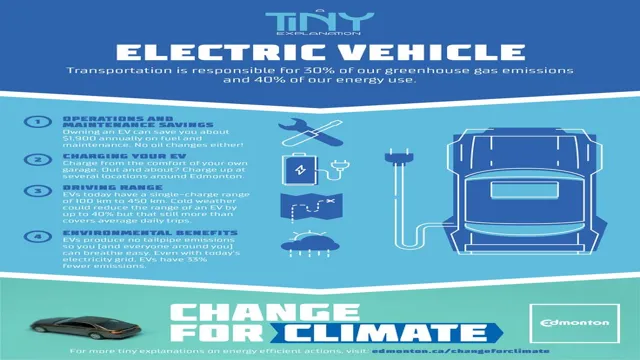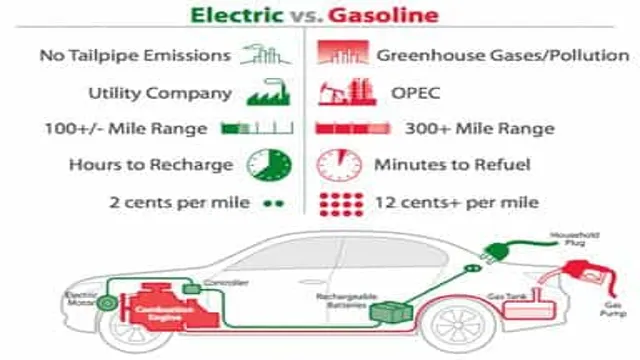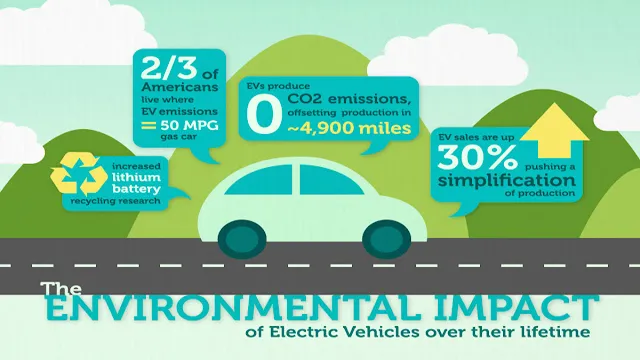Drive into the Future: The Top Benefits of Owning an Electric Car
Electric cars are a hot topic, and understandably so. They are eco-friendly, sleek, and efficient. Gone are the days when drivers could only choose from a limited selection of gas-guzzling vehicles.
Nowadays, there are a plethora of electric cars available on the market, and they come with loads of benefits. Many people are starting to consider purchasing an electric vehicle (EV) over a traditional gasoline car. But why? What makes electric cars so appealing? In this blog post, we will explore the numerous benefits of owning an electric car and why you might want to make the switch yourself.
Environmental Impact
Owning an electric car comes with a multitude of benefits, including a positive impact on the environment. With concerns over climate change and air pollution, electric cars are an eco-friendly alternative to traditional gas-powered vehicles. Electric cars emit fewer harmful pollutants into the air, which reduces the overall carbon footprint.
Additionally, electric cars produce less noise pollution, making them ideal for urban areas that are plagued by traffic and noise. By choosing to drive an electric car, you are contributing to a cleaner and more sustainable future. But it’s not just good for the environment; owning an electric car can also save you money on fuel costs in the long run.
With advancements in technology, electric cars are becoming more affordable and accessible. So why not make the switch and invest in a sustainable future?
Lower Emissions
Lowering emissions is essential for reducing the negative impact that human activities have on the environment. Whether it’s the pollution caused by fossil fuel consumption, the greenhouse gases released by deforestation, or the waste produced by industrial processes, every human activity has an impact on the planet. By lowering emissions, we can help reduce that impact and mitigate the effects of climate change.
One way to reduce emissions is by transitioning to clean energy sources like wind, solar, and hydroelectric power. This approach not only reduces carbon emissions but also leads to cleaner air and water and supports sustainable development. Another way to lower emissions is by using more efficient technologies and processes that consume less energy and emit fewer harmful substances.
Whether it’s through public policies, corporate initiatives, or individual efforts, everyone can play a role in lowering emissions and protecting the environment for future generations.
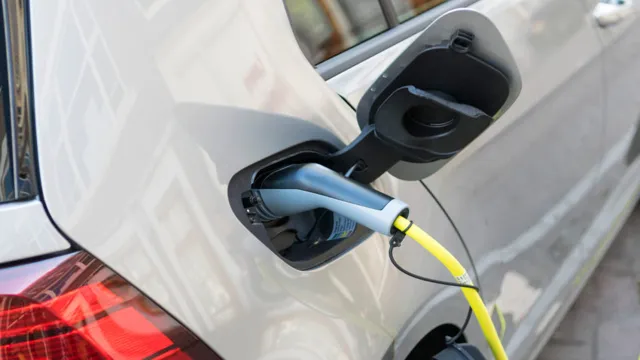
Reduced Carbon Footprint
Reduced Carbon Footprint As individuals and businesses, we all have a responsibility to reduce our carbon footprint and lessen our impact on the environment. One of the most effective ways to do this is to reduce our use of fossil fuels, which are major contributors to greenhouse gas emissions. This can be achieved through a variety of methods, such as using public transportation, carpooling, biking or walking instead of driving alone, and using energy-efficient appliances and equipment.
Additionally, we can reduce our reliance on plastic by using reusable bags, water bottles, and containers, and properly disposing of any waste. These actions may seem small, but they can have a significant impact when done collectively. By making conscious choices and being mindful of our impact on the environment, we can do our part to reduce our carbon footprint and preserve our planet for generations to come.
Financial Advantages
One of the biggest financial advantages of owning an electric car is the savings on fuel costs. Unlike traditional gas-powered cars, electric cars run on electricity, which can be significantly cheaper than gasoline. The cost of driving an electric car can be as little as 2 cents per mile, compared to the average of 12 cents per mile for a gasoline-powered car.
Additionally, electric cars require less maintenance than traditional cars, thanks to their simpler design and lack of an internal combustion engine. This translates to lower repair costs and longer periods between servicing. Moreover, governments often offer incentives, such as tax credits and rebates, to encourage the purchase of electric cars, which can further offset the initial cost of buying one.
Overall, the financial benefits of owning an electric car make it an attractive option for those looking to save money on transportation.
Lower Operating Costs
Lowering operating costs is a crucial aspect of running a successful business. It helps to increase profitability, which in turn frees up capital for essential investments and allows for greater financial flexibility. A major financial advantage of lowering operating costs is that it reduces the overall burden on the company’s budget.
This, in turn, allows for more resources to be allocated towards improving product quality, customer service, and other core business functions. Additionally, by reducing costs, a company can improve its pricing strategy, making products and services more affordable and competitive in the market. This not only attracts new customers but also helps to retain existing ones.
By implementing cost-saving measures such as sourcing materials at lower prices, reducing energy consumption, and streamlining processes, companies can experience significant savings that can be reinvested into their business. In the long run, strategic cost-cutting can lead to greater financial stability and success for any organization.
Tax Credits and Incentives
Tax credits and incentives can provide businesses and individuals with significant financial advantages. These incentives come in various forms, from tax credits and exemptions to grants and subsidized loans. Many countries and states offer tax incentives to encourage businesses to invest in research and development, hire employees, or move to a particular region.
For example, the US provides tax credits for purchasing electric vehicles as a way to reduce carbon emissions. Tax incentives are also available for small businesses that hire veterans or individuals from economically disadvantaged areas. By taking advantage of these tax credits and incentives, individuals and companies can reduce their tax liabilities, access additional funding, and improve their bottom line.
It’s essential to research and understand the different tax credits and incentives available to determine which ones could benefit your unique situation.
Resale Value
When it comes to buying a car, resale value is an important factor to consider. Purchasing a car with a high resale value can offer financial advantages in the long run. Essentially, resale value is a measure of how much a vehicle is worth when sold or traded in.
Cars with a high resale value retain their value longer and are more in demand than cars with a lower resale value. This means that when it comes time to sell or trade in your car, you can expect to receive more money for it. This can be a significant advantage for those who like to upgrade their car every few years.
By purchasing a car with a high resale value, you can save money in the long run, as you will receive a higher offer when it comes time to sell your vehicle. So, when you are in the market for a new car, be sure to consider the resale value as an important factor to help you make a smart investment.
Improved Performance
Owning an electric car comes with numerous benefits, one of which is improved performance. With the advancements in technology, electric cars have become more powerful and efficient. They offer instant torque, which means you can accelerate faster than traditional gasoline-powered vehicles.
This is because electric motors can deliver maximum torque from a standstill, unlike internal combustion engines that have to build up torque gradually. Another advantage of owning an electric car is that they do not waste energy through heat production and transmission like gas-powered vehicles. This makes electric cars more efficient, resulting in longer range per charge.
Plus, electric cars are quieter than traditional cars, creating a more peaceful and serene driving experience. By choosing an electric car, you not only reduce your carbon footprint, but you also enjoy better performance without harming the environment.
Instant Torque
One of the most exciting things about driving an electric car is the instant torque it delivers. Unlike traditional gasoline cars that have to rev their engines to build up power before accelerating, electric cars can instantly deliver maximum torque as soon as you press the accelerator. This means that even modestly-powered electric cars can feel incredibly quick and responsive on the road.
But what’s equally thrilling about this instant torque is how smooth and quiet it is. There’s no jerky shifting or engine noise – just a seamless surge of power that propels you forward. It’s almost like riding a rollercoaster, where you’re pushed back into your seat as you accelerate.
And because electric motors have no gears, there’s no need to worry about shifting or getting stuck in the wrong gear. You simply press the accelerator and enjoy the ride. So if you’re looking for improved performance and an exhilarating driving experience, an electric car with instant torque might just be for you.
Quieter Ride
There’s nothing quite like a smooth, quiet ride, and improved performance can make all the difference. Whether you’re an experienced driver or just getting started, you’ll appreciate the benefits of a more responsive vehicle. With advanced technology and engineering, modern cars are designed to be faster and more fuel-efficient than ever before.
This means you can enjoy improved acceleration, more precise steering, and better overall handling. And with quieter engines and less road noise, you can focus on the road ahead and enjoy a more relaxing ride. So if you’re looking for a car that can offer improved performance and a quieter ride, there’s never been a better time to start shopping.
Whether you’re looking for a compact car or a full-sized SUV, there are plenty of options available for every budget and lifestyle.
Convenience
When it comes to owning an electric car, one of the biggest benefits that cannot be ignored is the convenience it provides. First and foremost, electric cars eliminate the need for frequent gas station visits, saving you time and hassle. Charging an electric car is as simple as plugging it in overnight, and many public charging stations are now available for on-the-go charging.
Another convenience factor is the reduced maintenance requirements for electric cars. With fewer moving parts and no combustion engine, electric cars require less maintenance and repairs than traditional gas cars. Not to mention, many electric car models come equipped with smart features such as remote start and pre-conditioning, allowing you to start and warm up your car from the comfort of your own home.
All in all, owning an electric car offers remarkable convenience that simply can’t be matched by traditional gas vehicles.
Home Charging
Home charging is a game-changer for electric car owners, providing unparalleled convenience that simply can’t be matched by traditional petrol refuelling. No longer will you have to make a detour to a petrol station, queue up in line, and smell like petrol after filling up your car. Instead, you can simply plug in your car at home and enjoy a cup of coffee or catch up on some work while it charges.
With the rising popularity of electric vehicles, many homeowners are now installing dedicated charging points in their garages or driveways, which can recharge your vehicle in as little as a few hours. Not only does home charging save you time, but it can also be more economical in the long run, particularly if you have a time-of-use tariff that charges you less for electricity during off-peak hours. So why bother with a smelly petrol station when you can have the convenience of home charging?
Reduced Maintenance
Reduced maintenance is a major benefit of modern technology. The convenience of not having to constantly perform upkeep on devices, appliances, and vehicles is a huge time-saver. With automated systems, many tasks are taken care of automatically, leaving owners with more time to focus on other things.
For example, self-cleaning ovens, dishwashers, and vacuum cleaners have become increasingly popular in recent years. These products not only save time, but also reduce the amount of effort required to maintain them. Similarly, cars today come with a host of safety features and built-in maintenance reminders, making it easier for drivers to stay on top of necessary repairs.
This reduced maintenance means more time to spend with loved ones, pursue hobbies, or simply relax. In short, modern technology has made our lives more convenient by allowing us to spend less time on maintenance and more time on things that matter.
Conclusion
If you think owning an electric car is all about being environmentally conscious and saving money on gas, think again. Sure, those are some pretty attractive perks, but there are so many more benefits to owning an electric car. For starters, you’ll be the envy of your neighborhood as you silently zip past gas-guzzling eyesores.
Plus, you’ll have the satisfaction of knowing you’re doing your part to reduce carbon emissions and help preserve our planet. And let’s not forget the convenience of never having to stop at a gas station again. So, if you want to make a smart investment that will make you feel good, look good, and do good, it’s time to switch to an electric car!”
FAQs
What are some advantages of owning an electric car?
Electric cars are environmentally friendly because they emit zero emissions. They are also cheaper to operate and maintain than traditional gas-powered cars.
How long does it take to charge an electric car?
The charging time for an electric car varies depending on the battery size, type of charger, and charging station. On average, a full charge can take anywhere from 4 to 8 hours.
How far can an electric car travel on a single charge?
The range of an electric car depends on the battery capacity and driving conditions. On average, most electric cars can travel between 100-250 miles on a single charge.
Do electric cars have tax incentives or rebates?
Yes, many countries and states offer tax incentives or rebates for purchasing an electric car to promote clean energy. These incentives can vary depending on the region and the type of electric car.
What is the lifespan of an electric car battery?
The lifespan of an electric car battery can vary depending on the brand and model, but they typically last between 8-10 years. Some manufacturers offer battery warranties for longer periods of time.
Are there enough charging stations for electric cars on long road trips?
While the number of charging stations is increasing rapidly, there may still be limited charging options in some areas. However, planning ahead and using apps to locate charging stations can ensure a smooth road trip experience.
